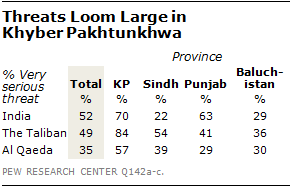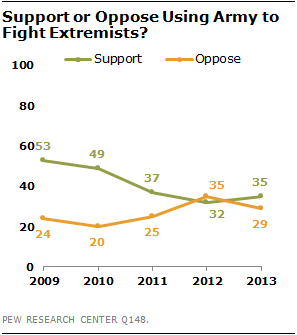
There is little support for extremist organizations in Pakistan. As has been true in recent years, relatively few people express a favorable opinion about the Taliban (11%) or al Qaeda (13%). Roughly four-in-ten Pakistanis offer no opinion about the latter.
However, these groups get somewhat higher ratings among supporters of the leading opposition party – 23% of those who identify with the Pakistan Muslim League-Nawaz party, or PML-N, view the Taliban and al Qaeda positively.
When asked more specifically about the Afghan Taliban and the Tehrik-i-Taliban (also known as the Pakistan Taliban, or TTP), Pakistanis also give these groups low ratings.
Opinions are more mixed regarding Lashkar-e-Taiba, an extremist group blamed in the 2008 Mumbai attacks and other terrorist incidents. About one-quarter (24%) express a favorable view of this organization, 36% rate it negatively and 40% do not give an opinion. Respondents who identify with the PML-N (40% favorable) and those living in Punjab province (34%) are more likely than others to give Lashkar-e-Taiba a positive rating.
Few Pakistanis have a positive view of the Haqqani network, although a solid majority (65%) do not have an opinion about this group, which is associated with the Taliban and is active on both sides of the Pakistan-Afghanistan border.
The Extremist Threat
Roughly half of Pakistanis say that India (52%) and the Taliban (49%) pose very serious threats to their country. Worries about the Taliban have risen sharply since last year, when 37% saw the group as a very serious threat.
About one-third of Pakistanis (35%) see al Qaeda as a very serious threat, up from 2012, when 27% held this view.

Perceptions of the various threats facing Pakistan differ somewhat across regions. Residents of Khyber Pakhtunkhwa province are most likely to rate all of these threats as very serious, and they are particularly concerned about the Taliban. Residents of Sindh are much more worried about the Taliban than India, while the reverse is true in Punjab, where 63% label India as a very serious threat and 41% say this about the Taliban. Also, supporters of the opposition PML-N party (69%) are more likely than supporters of the ruling PPP (20%) to consider India a very serious threat.
When asked to choose which is the greatest threat to their country – India, the Taliban or al Qaeda – respondents are divided between India (38%) and the Taliban (33%). Only 4% name al Qaeda. Views have shifted significantly since last year, when 59% chose India and 23% said the Taliban.

Another indicator of how concerned the country has become about extremism is that 36% of Pakistanis are very worried that extremist groups will take over the country. This is up from 26% last year, although still lower than the 45% registered in 2009, when the battle with the Taliban was raging in the Swat Valley.
Pakistanis are somewhat divided over whether to use the military to fight extremist groups. Roughly a third (35%) are in favor of using the Pakistani army to fight extremists in the Federally Administered Tribal Areas (FATA) and Khyber Pakhtunkhwa, while 29% oppose this policy. Views today are very different from 2009, when 53% backed using the military in this way. Still, the percentage who say they oppose this idea has dropped slightly since last year.




